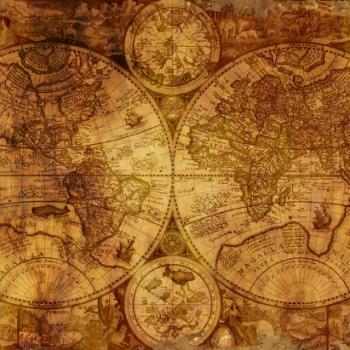
If you are a frequent reader of this blog, you will have noticed that I use the term ‘wisdom traditions’ when I refer to religions, spiritual paths, first nation customs, and mystical insights. Allow me to explain why.
The World’s Religions
I was first introduced to the term when I read The World’s Religions by Huston Smith. The book accomplished the rarest of achievements; it captured both my heart and head. Smith managed to vax poetic and instill the rational essence of each religion simultaneously. I marveled at chapter after chapter, taking each in like a five-course meal with the corresponding taste, aroma and lingering satisfaction.
Puzzled at First
Smith’s umbrella term was a bit confusing to me at first. Wisdom traditions? What does he mean by that, exactly? It wasn’t immediately obvious to me that everything was equally wise or that all traditions were necessarily good, especially since many of them were already extinct. But, because I was savoring the book and only read one chapter per month, I allowed the idea to percolate and got a fuller grasp of its meaning.
Gift of Time
Having the gift of time is a wonderful thing. As Daniel Kahneman documented in his book, Thinking, Fast and Slow, our dominant interaction with the world is fast. It allows us to judge circumstances quickly and easily. The downside is that fast thinking encourages us to accept and reject ideas without much thought. Without the gift of time, I might easily have rejected the ‘wisdom tradition’ concept altogether. That was my first instinct, after all. I’m glad I had time to think slowly.
Wisdom is Essential
Wisdom is not found in every word of every tradition. Rather, wisdom is the essence we can extract from whatever we are studying.
To take an unrelated example, learning to drive includes a lot of information about everything from traffic rules to how a car works in a variety of circumstances. But if a seasoned driver is asked about the wisdom of driving, that person is likely to offer general statements such as, “driving is being attentive,” or “driving is freedom.”
There is something essential about wisdom. It gets to the heart of the matter and is not always easily accessible to those who have neither put in work nor effort to really understand something.
True But Partial
If you read my extended essay on how Ken Wilber’s integral philosophy changed my life, you may remember an idea that is central to his entire worldview; that the human mind is incapable of being one hundred percent wrong. In the introduction to his Collected Works, Wilber wrote:
“The real intent of my writing is not to say, you must think in this way. The real intent is: here are some of the many important facets of this extraordinary Kosmos; have you thought about including them in your own worldview? My work is an attempt to make room in the Kosmos for all of the dimensions, levels, domains, waves, memes, modes, individuals, cultures, and so on ad infinitum. I have one major rule: Everybody is right. More specifically, everybody—including me—has some important pieces of truth, and all of those pieces need to be honored, cherished, and included in a more gracious, spacious, and compassionate embrace. To Freudians I say, Have you looked at Buddhism? To Buddhists I say, Have you studied Freud? To liberals I say, Have you thought about how important some conservative ideas are? To conservatives I say, Can you perhaps include a more liberal perspective? And so on, and so on, and so on… At no point I have ever said: Freud is wrong, Buddha is wrong, liberals are wrong, conservatives are wrong. I have only suggested that they are true but partial. My critical writings have never attacked the central beliefs of any discipline, only the claims that the particular discipline has the only truth—and on those grounds I have often been harsh. But every approach, I honestly believe, is essentially true but partial, true but partial, true but partial. And on my own tombstone, I dearly hope that someday they will write: He was true but partial…”
The idea of everything being true but partial deeply resonated with me and made it easier to accept all the different traditions as carriers of wisdom.
Encapsulated Wisdom
The final thought that convinced me to use the term ‘wisdom traditions’ in my writings and conversations was encapsulation. The dictionary defines the word as both; 1. express the essential features of (something) succinctly and 2. enclose (something) in or as if in a capsule.
In my interspiritual explorations, I have repeatedly sought encapsulated wisdom in everything from sacred texts to prayers and rituals. In most cases, I have found what I was looking for.
Wisdom in Every Tradition
Taken together, these reasons have convinced me that every tradition contains wisdom that is worth exploring. Sometimes it is apparent. Other times it is hidden and digging is needed. For better or worse, the traditions have become the vehicles that have preserved spiritual wisdom and carried it through time for us to explore.
Gudjon Bergmann
Author and Mindfulness Teacher
Amazon Author Profile
Recommended books:
- Monk of All Faiths: Inspired by The Prophet (fiction)
- Spiritual in My Own Way (memoir)
- Co-Human Harmony: Using Our Shared Humanity to Bridge Divides (nonfiction)
- Experifaith: At the Heart of Every Religion (nonfiction)
- Premature Holiness: Five Weeks at the Ashram (novel)
- The Meditating Psychiatrist Who Tried to Kill Himself (novel)
Picture: CC0 License
















